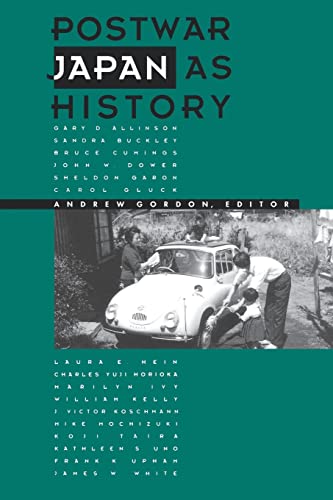Postwar Japan as History
Andrew Gordon
BOOK REVIEW

The narrative of Postwar Japan as History by Andrew Gordon is a vivid tapestry that intricately weaves the complexities of Japan's identity transformation post-World War II. This monumental work isn't just an account; it gripps at the very core of Japanese society, challenging our perceptions of history, culture, and identity with every page. You find yourself immersed in a landscape where tradition clashes with modernity and where the echoes of war still reverberate through the streets of Tokyo.
Gordon, a respected historian, pulls back the curtain to reveal the layers of the Japanese experience, juxtaposing economic recovery with social upheaval, and the rise of consumerism against the backdrop of political turmoil. Through meticulous research, he deftly navigates the political, cultural, and social transformations that have defined Japan for decades, urging you to confront the discomforting realities that often lie beneath the surface of a polished, mythologized national identity.
What sets this work apart is its ability to turn dry facts into a compelling narrative. Gordon doesn't just throw data at you; he makes you feel the history. You can almost hear the clatter of construction in postwar urban landscapes and sense the palpable tension as individuals grapple with their roles in a rapidly changing society. It's a book that compels you to reflect-are we as societies ever truly free from our past? As you delve deeper, you'll feel the burning desire to confront your own historical narratives.
The feedback surrounding Postwar Japan as History is as diverse as the subject matter itself. Some readers hail it as a transformative lens through which to view not only Japan but the broader implications of postwar recovery in global contexts. Others argue that the book's dense academic nature can be overwhelming at times, potentially alienating those who aren't already well-versed in Japanese history. Yet, isn't that precisely what makes this text essential? It forces us to face the complicated truth rather than providing easy answers or romanticized versions of events.
Gordon's narrative serves as a reminder that history isn't static; it's dynamic and perpetually evolving, shaped by the voices and experiences of those who lived through it. It challenges you to consider the implications of ignoring such histories in our contemporary society, where the specter of nationalism and cultural memory loom large.
Engaging with this book means embracing discomfort-the author's penetrating insights leave a mark, pushing you to rethink not just Japan's postwar identity, but your understanding of historical narratives as a whole. Each chapter is a stir of emotions; joy and sorrow intertwine as we witness an entire nation's resilience and struggle to redefine itself.
You may find yourself haunted by the stories of ordinary people, their aspirations woven into the fabric of a society that often feels like a mirror reflecting our current global dilemmas. What might you learn about your own identity from the collective identity failures and successes that Gordon so expertly documents?
In reading Postwar Japan as History, you'll become not just an observer, but a participant in the ongoing conversation about how history shapes our present. The book, with its passionate prose and critical insights, is a call to engage, to probe deeper, and to wrestle with the narratives we accept and those we disregard. It's not just about Japan; it's about the world we live in-and the histories we've yet to fully understand. So, it begs the question: are you ready to confront the past to redefine the future? 🌍
📖 Postwar Japan as History
✍ by Andrew Gordon
🧾 512 pages
1993
#postwar #japan #history #andrew #gordon #AndrewGordon